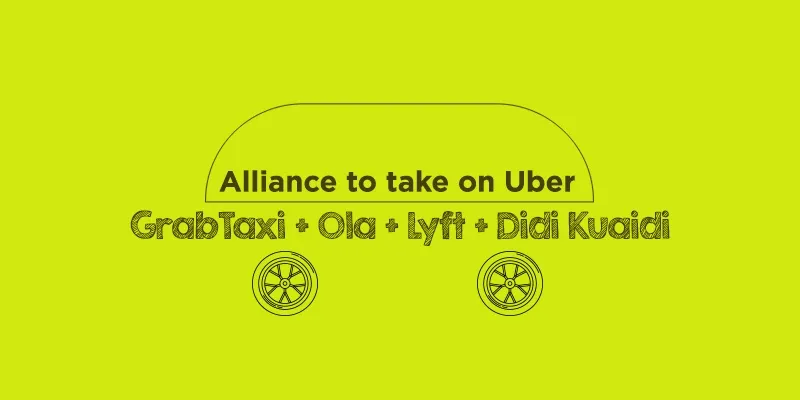Ola, GrabTaxi, Lyft and Didi Kuaidi join hands to beat back Uber
A common enemy is the best way of sealing friendships. Nothing could prove this statement more than the recent joining of hands between taxi hailing companies Ola, Didi Kuaidi, GrabTaxi and Lyft.

The alliance is purportedly for providing a “seamless ridesharing coverage for travelers in India, China, SE Asia and the US,” according to the statement released by the foursome earlier on Friday. But anyone who has observed the taxi hailing sector will recognise that this partnership is to take on Goliath Uber.
Uber is present in 67 countries and is growing rapidly. The US-based company has raised over $8 billion so far, and according to a Bloomberg report is set to raise over $2 billion more at an eye-watering $62.5 billion valuation. According to the report,Uber has already raised a part of this funding. Uber is known for its aggressive, take-no-prisoners approach in every market it enters. But in Asia—India, China, and South East Asia—it has faced stiff competition from local players.
Ola, which just days ago announced raising $500 million, is the market leader in India with operations in 200 cities. Didi Kuaidi, which is an investor in Ola, GrabTaxi and Lyft, is the leader in China and serves over 250 million users across 360 Chinese cities. The company was formed when Chinese taxi hailing apps Didi Dache and Kuaidi Dache merged in February. Lyft, which operates in 190 cities in the US, has become a strong competitor in Uber’s home market. Singapore-based GrabTaxi has its stranglehold on Malaysia, Singapore, Indonesia, Philippines, Vietnam, and Thailand.
Collectively, the four companies have raised $7 billion. On a side note, Uber’s latest fundraise brings on board a new investor—Tiger Global—according to the Bloomberg report. Tiger is an investor in Ola, Didi Kuaidi, and GrabTaxi.
Coming back to the alliance, international travellers now will be able to access “local on-demand rides by using the same application they use at home.”The four companies said they intend to leverage each other’s technology, local market knowledge, and business resources. The alliance will start rolling out joint products from the first quarter of 2016. In September, DidiKuaidi had entered into an alliance with Lyft to share riders across continents and the latest announcement is an extension of the partnership.
“This will also allow all four companies to learn from each other’s local innovations and successes that can help us in our shared mission to build better mobility solutions in our respective markets,” said Bhavish Aggarwal, Co-founder and CEO of four-year-old Ola.
Ola and GrabTaxi have been using highly localised solutions to stay ahead of Uber. For example, to make on-demand cab affordable, Ola introduced Ola Mini and launched intra-city bus service Ola Shuttle. GrabTaxi facilitates loans to its drivers for buying smartphones in Philippines and offers free English-language classes for taxi drivers.
DidiKuaidi, as a backer of Ola, GrabTaxi, and Lyft, has emerged as the face of this global fight back.
“This (the alliance) will be a win for the diversity and vitality of the global rideshare industry,” said Cheng Wei, CEO of Didi Kuaidi, in an obvious dig at the monopoly that Uber is trying to build.
YourStory take
Taxi-hailing globally has become the most exciting emerging sector, what with the billions of dollars it has attracted and the battles that have broken out between Uber and local competitors, traditional taxi operators and governments.
The alliance shows just how potent a competitor Uber is. The alliance will also make each of the companies in it stronger, at least that is what those helming and backing Ola, Didi Kuaidi, Lyft, and GrabTaxi hope. This is also good news for millions of customers and many thousands of taxi drivers, as more competition will mean low prices for the former and better incentives for the latter.
However, many billions of dollars is being spent to fund this battle and that should start concerning investors and the public soon.







